Big Ideas From Bali: Learning With Eco-Minded MLEs

Happy June, my favorite month of the year! I recently returned from Bali, where I had taken my capstone class of future K–5 educators on one of our university’s Global Immersion trips. Here you can see images from the trip, which was a combination of cultural immersion and teaching multilingual learners of English (MLEs) at an after-school learning center. It was a transformative learning experience for all involved. My students and I learned about the lives and values of our Balinese students and about the ways in which the lessons we had designed in advance for the students turned out to be lessons for ourselves as well — where Balinese students, families and the community were our teachers.
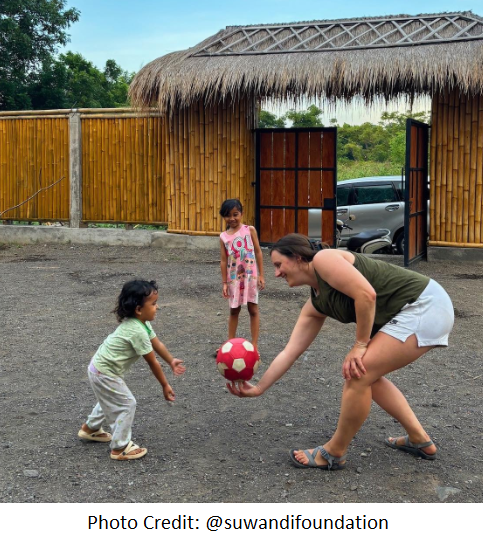 Learning From Students
Learning From Students
During a lesson on jobs and careers, where students shared some common jobs in their respective countries, my students discovered that for many of the jobs in the United States, the Balinese students responded, “we just do that ourselves.” This included jobs like plumber, electrician, and carpenter. Students were also our teachers in their cultural traditions, including Balinese dance, the basic movements of which they attempted to teach us (with some lighthearted frustration on both sides)! We observed as students took swimming lessons in the ocean, rather than in a swimming pool — and why not? The ocean was immediate, inviting, and eco-friendly.
Learning From Community
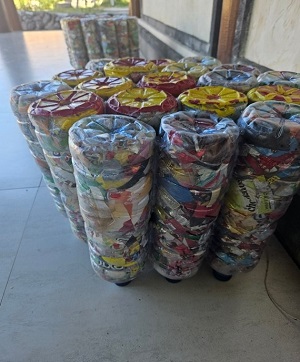 My students also taught lessons on waste management, plastic pollution, and microplastics. As part of our learning we visited the MERO Foundation (the Indonesian Marine Education & Research Organization), a women-run nonprofit doing cutting-edge work in marine education and research. There we learned that the United States and other nations send their trash to Indonesia, thus multiplying the country’s already existing waste management problems. For more on this, you can watch the film Plastic Island. Students at the afterschool learning center are also raising awareness and doing their part. We saw students using chairs and stools they had built from plastic trash they had recycled into furniture (picture right).
My students also taught lessons on waste management, plastic pollution, and microplastics. As part of our learning we visited the MERO Foundation (the Indonesian Marine Education & Research Organization), a women-run nonprofit doing cutting-edge work in marine education and research. There we learned that the United States and other nations send their trash to Indonesia, thus multiplying the country’s already existing waste management problems. For more on this, you can watch the film Plastic Island. Students at the afterschool learning center are also raising awareness and doing their part. We saw students using chairs and stools they had built from plastic trash they had recycled into furniture (picture right).
Ecoliteracy and Sustainability: Bali Green School
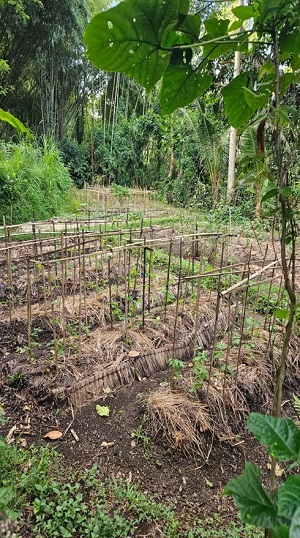 My class visited the world-renowned and awe-inspiring Bali Green School, considered by many to be among the most exemplary models of K–12 sustainability and environmental education globally (where others include, for example, the SEEQS school in Hawai’i). There, located in the Balinese jungle, students learn environmental education in an environmental education science center; practice sustainability; learn the ethics, principles, and practices of permaculture and “green studies”; and tend to the school garden (picture left), which provides food for school lunches.
My class visited the world-renowned and awe-inspiring Bali Green School, considered by many to be among the most exemplary models of K–12 sustainability and environmental education globally (where others include, for example, the SEEQS school in Hawai’i). There, located in the Balinese jungle, students learn environmental education in an environmental education science center; practice sustainability; learn the ethics, principles, and practices of permaculture and “green studies”; and tend to the school garden (picture left), which provides food for school lunches.
The school’s biophilic design of bamboo is as impressive as its ecoliteracy curriculum, which was focused at the time we visited on learning about, growing, and producing products from mycelium, and included a unit on mangroves. We also observed that students were studying how to create a biomimetic earthquake shelter by taking inspiration from the forms of the pangolin, sea sponge, and sea urchin! Students at this school do creative and impressive real-world, mainly student-driven, problem- and project-based work with authentic assessments — no standardized testing.
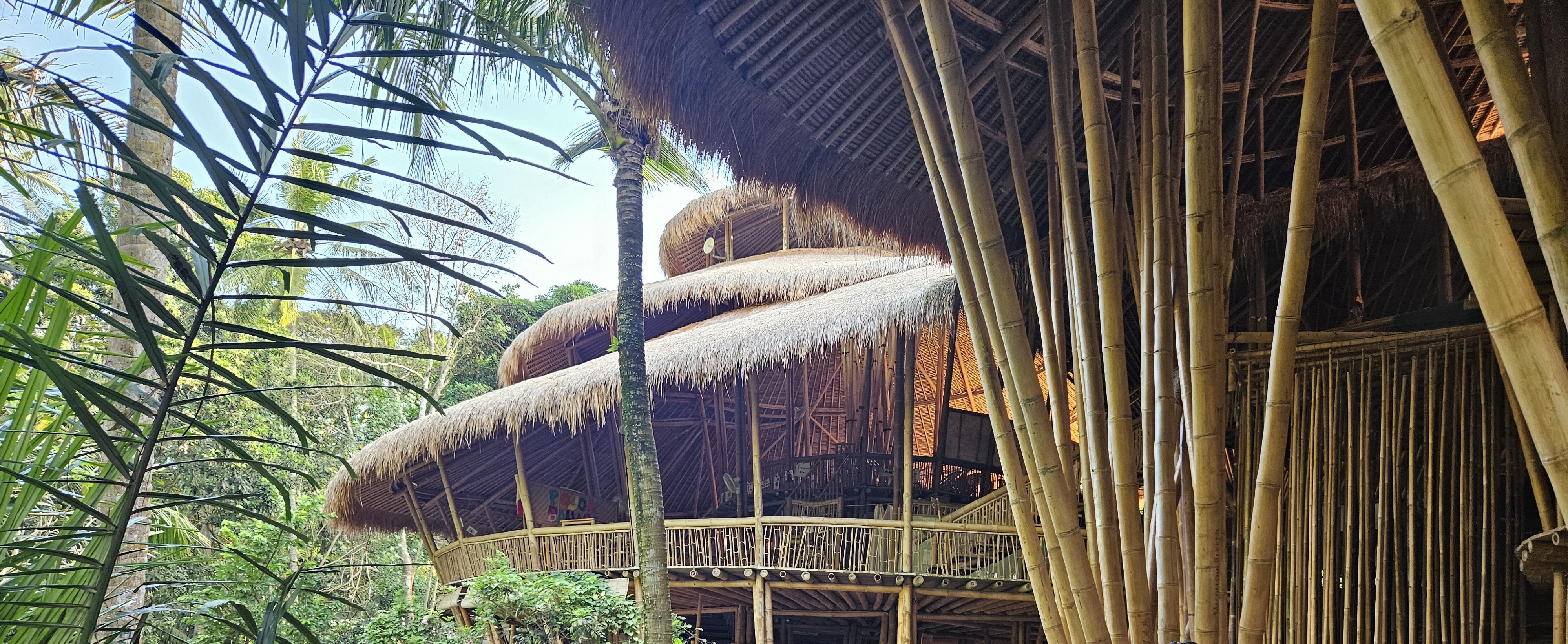
Cross-Cultural Learning: Focus on Community and Humanity
In Bali there is a clear focus on others over a concern with self — on the group rather than the individual, and on kindness as an imperative. Although we witnessed examples of these values in practice on a daily basis, I began to understand this better after visiting a museum and cultural center where the many rituals and ceremonies that mark a Balinese Hindu person’s life from conception through death (and beyond) were explained.
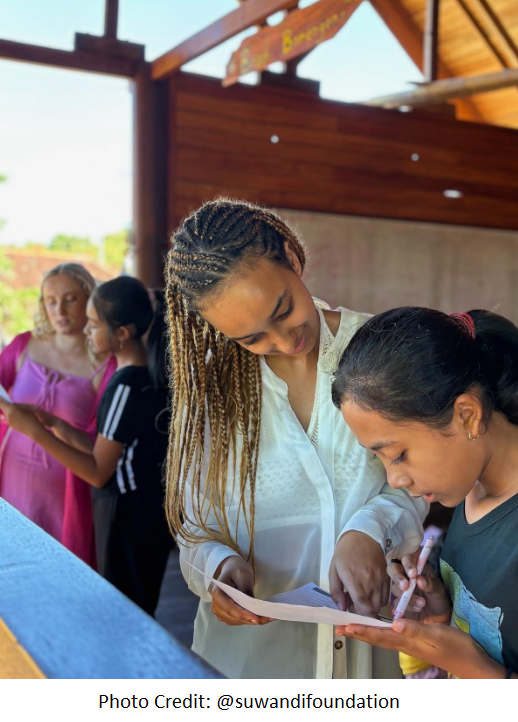 An individual is valued highly simply for existing; value does not need to be earned (especially through material gain) — rather, it is one’s birthright, and family and community are unconditional constants. For these reasons, people feel held and cared for and loved in ways that do not tend to lead to the levels of loneliness and depression that are documented in many highly industrialized and wealthy nations, which are often (but not always) societies that highly value consumerism, materialism, and individualism. It was explained to me that the trinity for many Balinese involves love of the divine, love of humanity, and love of nature. It appeared that this was a recipe that resulted in happiness, at least among the people I met. Further, the Hindu belief in the concepts of karma and reincarnation motivates believers toward wanting to live lives of honesty and harmony.
An individual is valued highly simply for existing; value does not need to be earned (especially through material gain) — rather, it is one’s birthright, and family and community are unconditional constants. For these reasons, people feel held and cared for and loved in ways that do not tend to lead to the levels of loneliness and depression that are documented in many highly industrialized and wealthy nations, which are often (but not always) societies that highly value consumerism, materialism, and individualism. It was explained to me that the trinity for many Balinese involves love of the divine, love of humanity, and love of nature. It appeared that this was a recipe that resulted in happiness, at least among the people I met. Further, the Hindu belief in the concepts of karma and reincarnation motivates believers toward wanting to live lives of honesty and harmony.
Problematizing Issues Around Teaching English as a Foreign Language
An issue that came up for us as teachers while in Bali concerned problematizing issues around teaching English on an island whose people are in relative poverty, whose economy is heavily tourism based, and where the language of communication is primarily English. My students found themselves asking “Are we teaching English to Balinese students primarily so that they can get jobs in tourism to serve English-speaking tourists?” It seemed potentially hegemonic and neocolonial.
We invited our local Balinese partners to join us for this discussion and reflection. Their insights were deep and powerful. They spoke about how learning English, even later in life, had allowed them many interactions and opportunities from which they had benefited personally and professionally and how this had allowed them to help others in their family and community. They explained that for almost any job in Bali, even those outside of tourism, inevitably, the first question on an application asks about one’s English proficiency. The ability to speak English is a major gate-keeper and thus a very valuable skill. They further explained that the students benefit greatly from meeting people from all over the world who come as volunteer teachers at the afterschool center, and how this expands students’ knowledge of the world and increases their confidence and communicative competence.
Opportunities for Growth
Teaching English as an additional language always provides opportunities for growth as we learn from and with our students. This month, here are a few things you can do:
- Engage with your MLEs in a study of different types of cultures, with those you select ranging from highly individualistic to very collectivist, and discuss what characterizes these societies and what values are associated with them.
- In terms of ecoliteracy, you may want to learn about biomimicry, about permaculture, or possibly more about plastics, which I discussed in a recent blog.
- Celebrate one of the many wonderful environmental days in June, which include World Environmental Day, World Oceans Day, Coral Triangle Day, World Day to Combat Desertification and Drought, or World Rainforest Day.
Enjoy!

